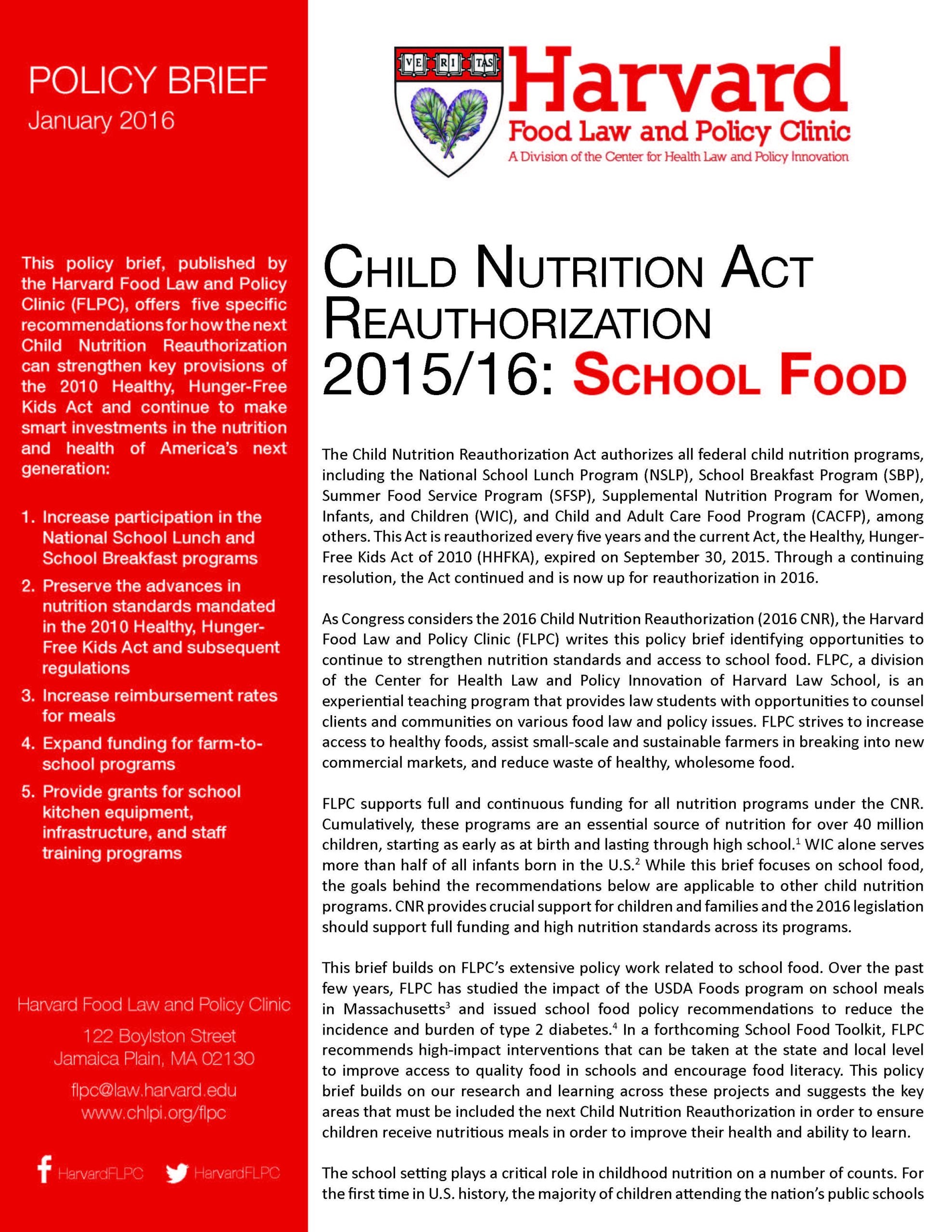As Congress prepares to consider the 2016 child nutrition act, the Harvard Food Law and Policy Clinic released a policy brief recommending changes to the act to support healthy school meals.
The centerpiece of federal child nutrition policy, the Child Nutrition Reauthorization Act (CNR), is up for review every five years and establishes the funding and policy for key programs, including the National School Lunch Program, School Breakfast Program, Summer Food Service Program, and Special Supplemental Nutrition Program for Women, Infants, and Children, serving 30 million children.
Harvard Law’s Food Law and Policy Clinic (FLPC) offers five specific recommendations for how the next CNR can strengthen key provisions for child nutrition:
- Increase participation in the National School Lunch and School Breakfast programs;
- Preserve the advances in nutrition standards mandated in the 2010 Healthy, Hunger-Free Kids Act (HFFKA) and subsequent regulations;
- Increase reimbursement rates for meals;
- Expand funding for farm-to-school programs; and
- Provide grants for school kitchen equipment, infrastructure, and staff training programs.
While FLPC supports full and continuous funding for all programs authorized under the CNR, the policy brief focuses on school food because of FLPC’s extensive work in this area and the critical importance of the school setting. Children who participate in school meal programs consume, on average, half of their daily calories at school. School meals also serve an important educational purpose, encouraging children to cultivate healthy eating habits.
In January, the Senate Agriculture Committee announced that it would hold a meeting to mark up the Senate’s draft bill, the Improving Child Nutrition Integrity and Access Act of 2016, on Wednesday, January 20, at 10 a.m. A live webcast of the hearing will be aired on the Senate Agriculture Committee website.
Next week’s markup was originally scheduled for Sept. 17, 2015, but was postponed only days before the meeting. Without the September markup, draft bills from the Senate and the House were never put forward, and the 2010 CNR (known as The Healthy, Hunger-Free Kids Act) expired on September 30. The Healthy, Hunger-Free Kids Act of 2010 included the most extensive changes to child nutrition programs since the 1970s, including enhanced nutrition standards for school meals, an issue that has taken center stage in this year’s CNR debates.
Over the past few years, Harvard Law School’s Food Law and Policy Clinic has studied the impact of the USDA Foods program on school meals in Massachusetts and issued school food policy recommendations to reduce the incidence and burden of type 2 diabetes. In a forthcoming School Food Toolkit, FLPC recommends high-impact interventions that can be taken at the state and local level to improve access to quality food in schools and encourage food literacy.
***
On June 10, FLPC co-hosted the first annual Healthy Food Fuels Hungry Minds conference at Harvard University to discuss how to improve the quality of food in schools.
During the June conference, Harvard Law School Lecturer on Law Emily Broad Leib, deputy director, Center for Health Law and Policy Innovation, and Bettina Neuefeind, research fellow, Harvard Food Law and Policy Clinic, delivered a presentation on “Understanding the Policy: Federal Child Nutrition Reauthorization and the Role of State and Local Decision-makers.”
As part of the conference, Jody Adams, chef/owner, Rialto Restaurant & Trade, and Ann Cooper, founder, The Chef Ann Foundation, delivered keynote addresses.
Katie Carey, a 3L at the University of Oregon School of Law and a 2015 summer intern at the Food Law and Policy Clinic, reported on the conference for the FLPC blog.
